干货:手把手教你发行属于自己的区块链Token
预先准备
- 以太坊钱包
- 一定数量的eth余额
- MetaMask
Token的参数
在发行之前首先要考虑Token的参数,譬如这篇教程准备发行如下Token
- Token的名称:Dylan Token
- Token的标识:DT
- 发行量:19940512
- Token的小数位:18
编写合约
想要基于以太坊拥有自己的Token,需要通过智能合约的形式去发行,编写如下基于ERC20的solidity代码:
pragma solidity ^0.4.18;
library SafeMath {
/**
* @dev Multiplies two numbers, throws on overflow.
*/
function mul(uint256 a, uint256 b) internal pure returns (uint256) {
if (a == 0) {
return 0;
}
uint256 c = a * b;
assert(c / a == b);
return c;
}
/**
* @dev Integer division of two numbers, truncating the quotient.
*/
function div(uint256 a, uint256 b) internal pure returns (uint256) {
// assert(b > 0); // Solidity automatically throws when dividing by 0
uint256 c = a / b;
// assert(a == b * c + a % b); // There is no case in which this doesn't hold
return c;
}
/**
* @dev Substracts two numbers, throws on overflow (i.e. if subtrahend is greater than minuend).
*/
function sub(uint256 a, uint256 b) internal pure returns (uint256) {
assert(b <= a);
return a - b;
}
/**
* @dev Adds two numbers, throws on overflow.
*/
function add(uint256 a, uint256 b) internal pure returns (uint256) {
uint256 c = a + b;
assert(c >= a);
return c;
}
}
contract ERC20Basic {
function totalSupply() public view returns (uint256);
function balanceOf(address who) public view returns (uint256);
function transfer(address to, uint256 value) public returns (bool);
event Transfer(address indexed from, address indexed to, uint256 value);
}
contract BasicToken is ERC20Basic {
using SafeMath for uint256;
mapping(address => uint256) balances;
uint256 totalSupply_;
/**
* @dev total number of tokens in existence
*/
function totalSupply() public view returns (uint256) {
return totalSupply_;
}
/**
* @dev transfer token for a specified address
* @param _to The address to transfer to.
* @param _value The amount to be transferred.
*/
function transfer(address _to, uint256 _value) public returns (bool) {
require(_to != address(0));
require(_value <= balances[msg.sender]);
// SafeMath.sub will throw if there is not enough balance.
balances[msg.sender] = balances[msg.sender].sub(_value);
balances[_to] = balances[_to].add(_value);
Transfer(msg.sender, _to, _value);
return true;
}
/**
* @dev Gets the balance of the specified address.
* @param _owner The address to query the the balance of.
* @return An uint256 representing the amount owned by the passed address.
*/
function balanceOf(address _owner) public view returns (uint256 balance) {
return balances[_owner];
}
}
contract ERC20 is ERC20Basic {
function allowance(address owner, address spender) public view returns (uint256);
function transferFrom(address from, address to, uint256 value) public returns (bool);
function approve(address spender, uint256 value) public returns (bool);
event Approval(address indexed owner, address indexed spender, uint256 value);
}
contract StandardToken is ERC20, BasicToken {
mapping (address => mapping (address => uint256)) internal allowed;
/**
* @dev Transfer tokens from one address to another
* @param _from address The address which you want to send tokens from
* @param _to address The address which you want to transfer to
* @param _value uint256 the amount of tokens to be transferred
*/
function transferFrom(address _from, address _to, uint256 _value) public returns (bool) {
require(_to != address(0));
require(_value <= balances[_from]);
require(_value <= allowed[_from][msg.sender]);
balances[_from] = balances[_from].sub(_value);
balances[_to] = balances[_to].add(_value);
allowed[_from][msg.sender] = allowed[_from][msg.sender].sub(_value);
Transfer(_from, _to, _value);
return true;
}
/**
* @dev Approve the passed address to spend the specified amount of tokens on behalf of msg.sender.
*
* Beware that changing an allowance with this method brings the risk that someone may use both the old
* and the new allowance by unfortunate transaction ordering. One possible solution to mitigate this
* race condition is to first reduce the spender's allowance to 0 and set the desired value afterwards:
* https://github.com/ethereum/EIPs/issues/20#issuecomment-263524729
* @param _spender The address which will spend the funds.
* @param _value The amount of tokens to be spent.
*/
function approve(address _spender, uint256 _value) public returns (bool) {
allowed[msg.sender][_spender] = _value;
Approval(msg.sender, _spender, _value);
return true;
}
/**
* @dev Function to check the amount of tokens that an owner allowed to a spender.
* @param _owner address The address which owns the funds.
* @param _spender address The address which will spend the funds.
* @return A uint256 specifying the amount of tokens still available for the spender.
*/
function allowance(address _owner, address _spender) public view returns (uint256) {
return allowed[_owner][_spender];
}
/**
* @dev Increase the amount of tokens that an owner allowed to a spender.
*
* approve should be called when allowed[_spender] == 0. To increment
* allowed value is better to use this function to avoid 2 calls (and wait until
* the first transaction is mined)
* From MonolithDAO Token.sol
* @param _spender The address which will spend the funds.
* @param _addedValue The amount of tokens to increase the allowance by.
*/
function increaseApproval(address _spender, uint _addedValue) public returns (bool) {
allowed[msg.sender][_spender] = allowed[msg.sender][_spender].add(_addedValue);
Approval(msg.sender, _spender, allowed[msg.sender][_spender]);
return true;
}
/**
* @dev Decrease the amount of tokens that an owner allowed to a spender.
*
* approve should be called when allowed[_spender] == 0. To decrement
* allowed value is better to use this function to avoid 2 calls (and wait until
* the first transaction is mined)
* From MonolithDAO Token.sol
* @param _spender The address which will spend the funds.
* @param _subtractedValue The amount of tokens to decrease the allowance by.
*/
function decreaseApproval(address _spender, uint _subtractedValue) public returns (bool) {
uint oldValue = allowed[msg.sender][_spender];
if (_subtractedValue > oldValue) {
allowed[msg.sender][_spender] = 0;
} else {
allowed[msg.sender][_spender] = oldValue.sub(_subtractedValue);
}
Approval(msg.sender, _spender, allowed[msg.sender][_spender]);
return true;
}
}
contract Token is StandardToken {
string public name = "Dylan Token";
string public symbol = "DT";
uint8 public decimals = 18;
uint256 public constant INITIAL_SUPPLY = 19940512;
function Token() public {
totalSupply_ = INITIAL_SUPPLY * (10 ** uint256(decimals));
balances[msg.sender] = totalSupply_;
}
}需要修改Token的名字name、标识symbol、发行量INITIAL_SUPPLY和小数位decimals的,直接在合约Token中修改相应的变量即可。
编译部署合约
打开Remix-Solidity IDE,一种在线的Solidity IDE。
将上述的三个合约代码导入至Remix中,点击start to compile进行编译。
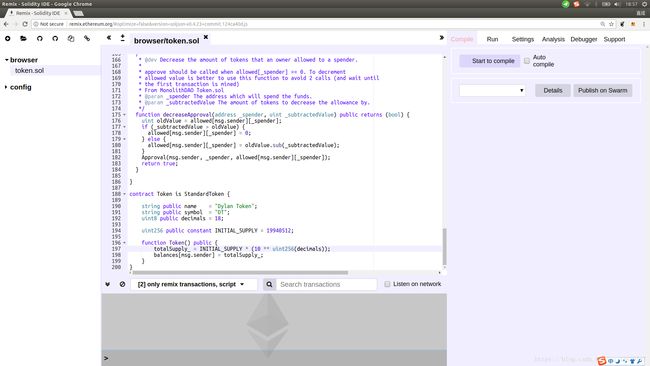
编译完成后切换到Run,下拉框选择Token,点击Deploy进行部署
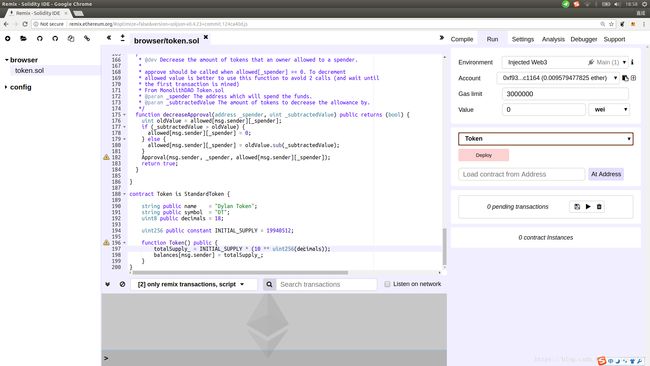
之后会弹出确认transaction的面板,拖到最下面点击confirm
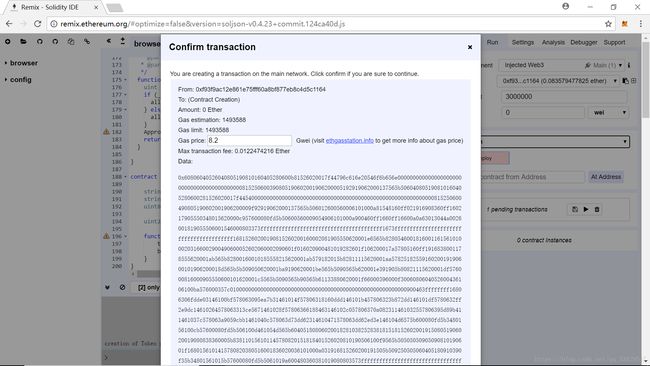
MetaMask会弹出,确认交易,点击submit
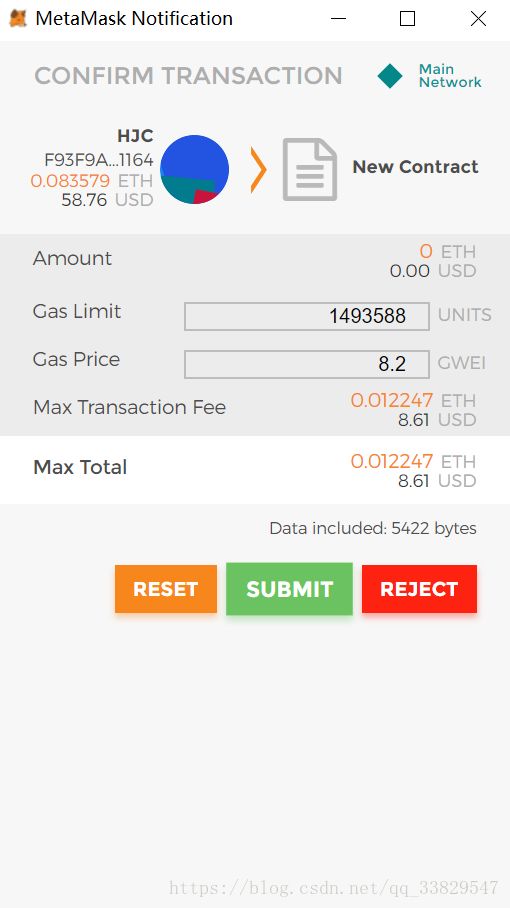
稍等片刻,交易被确认,会出现下图红框所示的合约地址,复制到剪贴板
教程中Dylan Token合约地址为:0x89731a2ddcef82a268d8925327c4080229914f05
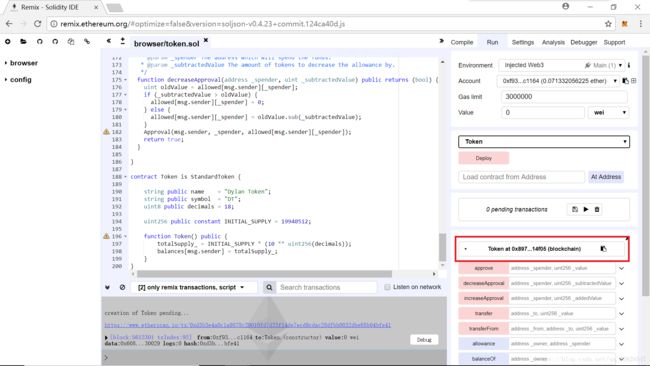
再进入MetaMask,点击Tokens——AddToken,粘贴复制的合约地址,点击Add
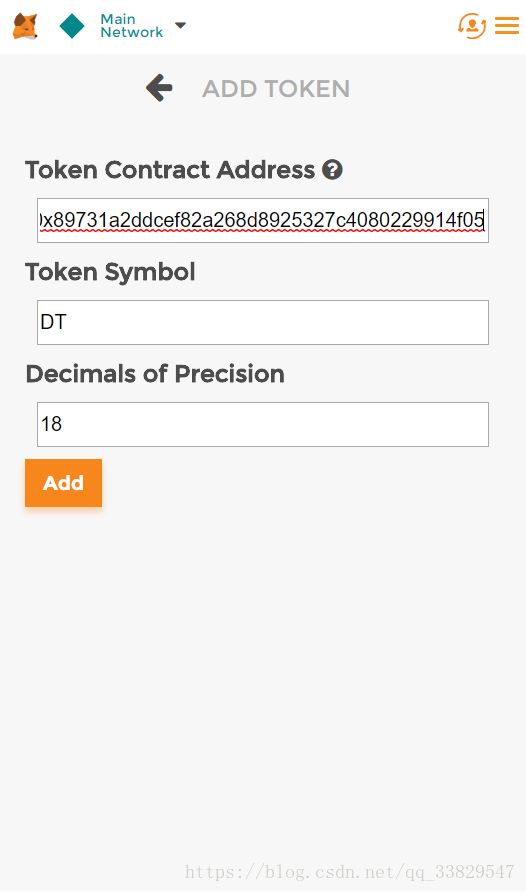
就可以在自己的钱包中看到刚刚发行的Token了
认证合约代码
注意:此步骤需科学上网,不然提交之前的验证码显示出不来。
在以太坊区块浏览器中找到自己的合约地址,点击Contract code——Verify and Publish,如下图所示
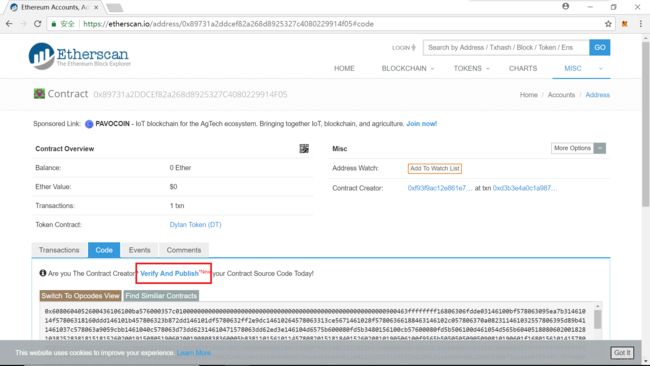
在Contract name:的输入框输入部署的合约名称Token, Compiler 选择在remix的sttings 中Solidity version 显示的版本号。Optimization 选择 No。 然后在Enter the Solidity Contract Code below 下面的输入框中原样填入Remix中的代码
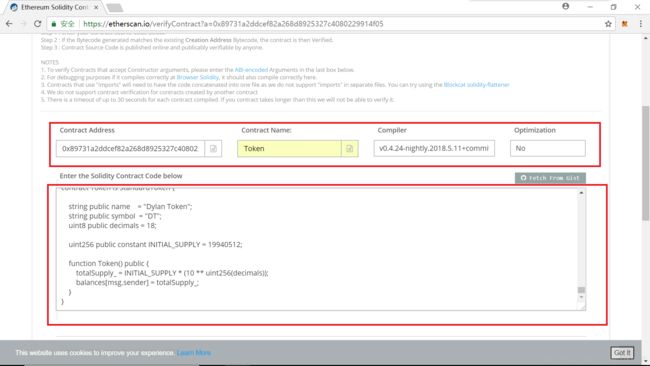
完成后点击提交,如果通过验证,跳转之后会显示如下图红框内所示的successfully的字样
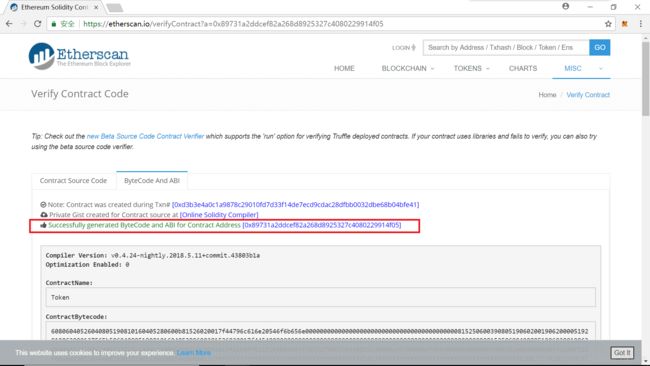
至此Token发行教程完结。